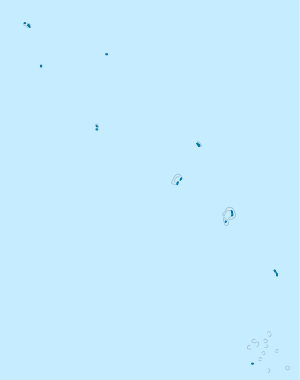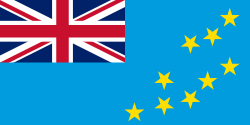Nukulaelae
Nukulaelae is an atoll that is part of the nation of Tuvalu, and has a population of 300 (2017 census) the largest settlement is Pepesala on Fangaua islet with a population of 247 people (2012 census).[1] It has the form of an oval and consists of at least 15 islets.[2][3] The inhabited islet is Fangaua, which is 1.5 kilometres (0.93 mi) long and 50 to 200 metres (160 to 660 ft) wide. The easternmost point of Tuvalu is Niuoko islet. The Nukulaelae Conservation Area covers the eastern end of the lagoon. A baseline survey of marine life in the conservation zone was conducted in 2010.[4][5]
Nukulaelae | |
|---|---|
 Nukulaelae atoll from space | |
 Nukulaelae Location in Tuvalu | |
| Coordinates: 09°22′12″S 179°48′31″E | |
| Country | Tuvalu |
| Population (2017) | |
| • Total | 300 |
| ISO 3166 code | TV-NKL |
Education
The junior school is Faikimua Primary School.
History
The traditional history of Nukulaelae is that a white-skinned man was the first person to sight the island, but he did not settle as there were no trees. Nukulaelae means 'the land of sands'.[6] Later, according to tradition, Valoa from Vaitupu discovered Nukulaelae while on a fishing expedition. He returned to Nukulaelae and planted coconut trees and eventually settled on Nukulaelae with his family.[6] On the islet of Tumuiloto was a malae named Fagafale where religious rights honouring ancestral spirits were practiced.[6] On the islet of Niuoka is a large stone at a place called Te Faleatua - 'the house of the gods.'[6]
In 1821 Nukulaelae was visited by Captain George Barrett of the Nantucket whaler Independence II He named the atoll ‘Mitchell’s Group’.[7]
Christianity first came to Tuvalu in 1861 when Elekana, a deacon of a Congregational church in Manihiki, Cook Islands became caught in a storm and drifted for 8 weeks before landing at Nukulaelae on 10 May 1861.[8][9][10]
The population of Nukulaelae in 1860 is estimated to be 300 people.[11][12] For less than a year between 1862–63, Peruvian ships, engaged in what came to be called the "blackbirding" trade, came to the islands seeking recruits to fill the extreme labour shortage in Peru, including workers to mine the guano deposits on the Chincha Islands.[13] While some islander were voluntary recruits the "blackbirders" were notorious for enticing islanders on to ships with tricks, such as pretending to be Christian missionaries. About 200 were taken from Nukulaelae[14] as immediately after 1863 there were fewer than 100 of the 300 recorded in 1861 as living on Nukulaelae.[11][15]
In 1865 a trading captain acting on behalf of the German firm of J.C. Godeffroy & Sohn obtained a 25-year lease to the eastern islet of Niuoko.[16] For many years the islanders and the Germans argued over the lease, including its terms and the importation of labourers, however the Germans remained until the lease expired in 1890.[16]
In 1896, HMS Penguin spent two days at Nukulaelae carrying out a scientific survey of the atoll.[17]
Nukulaelae Post Office opened around 1923.[18]
The atoll was claimed by the United States under the Guano Islands Act from the 19th century until 1983, when claims to the atoll were ceded to Tuvalu.
2019 election results
Nukulaelae is one of the eight constituencies in Tuvalu. Unlike the other seven, it elects just one Member of Parliament, rather than two. The 2019 general election was held on 9 September 2019. Seve Paeniu was elected to represent Nukulaelae in the parliament.[19]
| Party | Candidate | Votes | % | |
|---|---|---|---|---|
| Non-partisan | Bikenibeu Paeniu | 99 | 17.1 | |
| Non-partisan | Luuni Tinilau | 96 | 16.7 | |
| Non-partisan | Namoliki S Neemia | 182 | 31.6 | |
| Non-partisan | Seve Paeniu |
199 | 34.5 | |
Notable local people
- Henry Faati Naisali (12 August 1928 – 29 October 2004) AO, CMG, MBE, was appointed Financial Secretary of the British Colony of Tuvalu in 1976. He was elected to represent Nukulaelae in the House of Assembly of the British Colony of Tuvalu in 1977. Naisali was elected to the Parliament of Tuvalu in 1981. He was appointed finance minister and deputy prime minister in 1985. Naisali was the Director of the South Pacific Bureau for Economic Co-operation from January 1986 to September 1988; he continued as Secretary General of the Pacific Islands Forum until January 1992.[20]
- Bikenibeu Paeniu (born 10 May 1956) represented Nukulaelae in the Parliament of Tuvalu from 1989 to 2006 and served two terms as Prime Minister of Tuvalu (1989-1993) & (1996-1999).
See also
- List of Guano Island claims
- Suamalie N.T. Iosefa, Doug Munro, Niko Besnier Tala O Niuoku, Te: the German Plantation on Nukulaelae Atoll 1865-1890 (1991) Published by the Institute of Pacific Studies. ISBN 9820200733
References
- "Population of communities in Tuvalu". Thomas Brinkhoff. 11 April 2012. Retrieved 20 March 2016.
- Map of Nukulaelae Atoll. Tuvaluislands.com.
- British Admiralty Nautical Chart 766 Ellice Islands (1893 ed.). United Kingdom Hydrographic Office (UKHO). 21 March 1872.
- Sandrine Job; Daniela Ceccarelli (December 2012). "Tuvalu Marine Life Scientific Report" (PDF). an Alofa Tuvalu project with the Tuvalu Fisheries Department. Retrieved 3 December 2013.
- Sandrine Job; Daniela Ceccarelli (December 2011). "Tuvalu Marine Life Synthesis Report" (PDF). an Alofa Tuvalu project with the Tuvalu Fisheries Department. Retrieved 3 December 2013.
- Tinilau, Vaieli (1983). "Chapter 14 - Nukulaelae". In Laracy, Hugh (ed.). Tuvalu: A History. Institute of Pacific Studies, University of the South Pacific and Government of Tuvalu. pp. 97–98. OCLC 20637433.
- Chambers, Keith S.; Munro, Doug (June 1980). "The Mystery of Gran Cocal: European Discovery and Mis-Discovery in Tuvalu". The Journal of the Polynesian Society. 89 (2): 167–198. JSTOR 20705476.
- "the 150th anniversary of the introduction of Christianity in Nukulaelae". Tuvaluislands.com. 18 May 2011. Retrieved 2 April 2013.
- Laumua Kofe (1980). Tuvalu: A History, Palagi and Pastors, Ch. 15. Institute of Pacific Studies, University of the South Pacific and Government of Tuvalu.
- Goldsmith, Michael; Munro, Doug (2002). The accidental missionary: tales of Elekana. Macmillan Brown Centre for Pacific Studies, University of Canterbury. ISBN 1877175331.
- Newton, W.F. (June 1967). "The Early Population of the Ellice Islands". The Journal of the Polynesian Society. 76 (2): 197–204. JSTOR 20704460.
- Bedford, Richard; MacDonald, Barrie; Munro, Doug (1980). "Population Estimates For Kiribati And Tuvalu, 1850-1900: Review And Speculation". Journal of the Polynesian Society. 89 (2): 199–246.
- Maude, H.E. (1981). Slavers in paradise : the Peruvian labour trade in Polynesia, 1862-1864. Australian National University Press. ISBN 9780708116074.
- The figure of 250 taken from Nukulaelae is given by Laumua Kofe, Palagi and Pastors, Tuvalu: A History, Ch. 15, U.S.P. & Tuvalu (1983)
- The figure of 250 taken from Nukulaelae is stated by Richard Bedford, Barrie Macdonald & Doug Munro, Population Estimates for Kiribati and Tuvalu (1980) 89(1) Journal of the Polynesian Society 199
- Suamalie N.T. Iosefa; Doug Munro; Niko Besnier (1991). Tala O Niuoku, Te: the German Plantation on Nukulaelae Atoll 1865-1890. Institute of Pacific Studies. ISBN 9820200733.
- Hedley, Charles (1896). "General account of the Atoll of Funafuti" (PDF). Australian Museum Memoir. 3 (2): 1–72.
- Premier Postal History. "Post Office List". Premier Postal Auctions. Retrieved 5 July 2013.
- Tahana, Jamie (10 September 2019). "Tuvalu elections: large turnover for new parliament". Radio New Zealand. Retrieved 10 September 2019.
- "Obituary: Henry Naisali". New Zealand Herald. 29 October 2004. Retrieved 24 June 2017.
